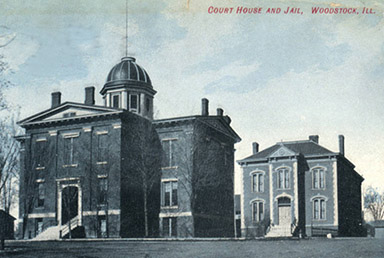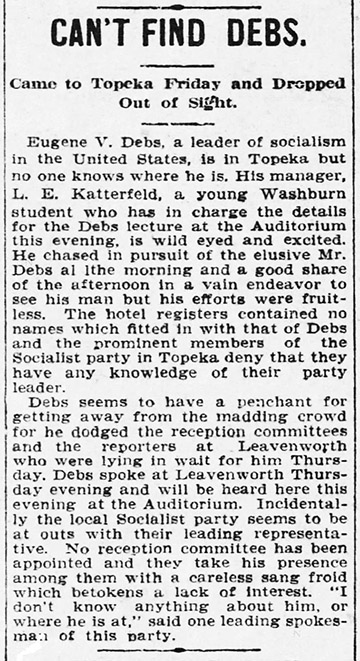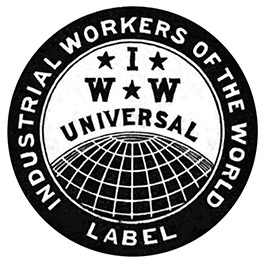
I was planning on writing this week about the Berger Affair of 1904-05, an interesting albeit arcane bit of Socialist Party history, or maybe about the founding convention of the IWW.
However, as luck would have it — and let there be no mistake, these blogs are driven as much by serendipity as design — I wound up going in an entirely different direction, leaving those big topics for another day.
Instead we will further examine Debs pursuing his career as a traveling orator in 1905.
 I lightly detailed Debs’s first tour of 1905, six weeks in February and March, as part of the February 23 edition of this blog. This first trip to Kansas, Oklahoma, and the Indian Territory was followed by a second tour in May to Indiana and Illinois, including a speech at Woodstock, where he had served six months in jail five years hence. At Woodstock he was introduced by Georgie Eckert, the namesake daughter of the sheriff who held him in custody — both of whom would become lifelong friends.
I lightly detailed Debs’s first tour of 1905, six weeks in February and March, as part of the February 23 edition of this blog. This first trip to Kansas, Oklahoma, and the Indian Territory was followed by a second tour in May to Indiana and Illinois, including a speech at Woodstock, where he had served six months in jail five years hence. At Woodstock he was introduced by Georgie Eckert, the namesake daughter of the sheriff who held him in custody — both of whom would become lifelong friends.
Titles of Debs’s paid lectures were malleable and he spoke extemporaneously, probably bending content slightly to fit a specific presentation, but generally following a standard set of themes — with these covered topics and their applause lines gradually evolving over time. The most common advertised title of the May Indiana & Illinois tour seems to have been “The Genius of Liberty.”
Thereafter it appears there was a short break before Debs embarked on a mini-tour of Ohio in June, a handful of dates followed by the founding convention of the Industrial Workers of the World in Chicago.
Debs apparently left the IWW convention before its conclusion in order to fill a 4th of July date booked six months in advance in McKinley, Montana, said to have been a small town located 25 miles from the nearest railroad station. I’m not even finding record of this town today; if this account is even remotely correct (and some newspaper accounts of this era are flat fabricated or wrong), it truly stands as one of the worst bookings of Debs’s entire career as a professional speaker. I need to relocate the newspaper clip where I saw this factoid — it seems weird on so many levels. We do know by his own testimony that he left the convention early to fill a speaking date.
Debs returned to the road in earnest the following month, speaking at a widely promoted Chautauqua crowd in Wathena, Kansas on August 5, followed by dates in Freeport, Kewanee, and Dixon, Illinois. He was apparently home in Terre Haute again by August 9 — Debs generally did not spend much time on the road during the sweltering months of summer.
He would kick off another lengthy stint on the road in September.
• • • • •

An Interview with a Small Town Newspaper
Debs was on a paid lecture tour for much of September and October 1905, depoliticizing these talks to some extent to extend his appeal to a broader audience with such titles as “Twentieth Century Problems” or “Possibilities of the Twentieth Century.” Beginning with a big Labor Day speech at a picnic in Knoxville, he delivered speeches in the states of Tennessee, Kentucky, Indiana, Ohio, Iowa, and Kansas during this series, including among them appearances in a number of very small locales.
On October 5 Debs pulled into Cherryvale, Kansas, then a town of about 4,000 people in the Southeastern part of the state, located about 70 miles away from the Appeal to Reason’s home base in Girard. There, prior to his evening lecture, Debs granted a short interview to a persistent and pesky local newspaper reporter which was — rather unusually as these things go — published in full, verbatim.
As it seems quite unlikely that this material will make the cut for the crowded and eventful Volume 4 of the Debs Selected Works, I thought that it might be interesting to pass along this material here as an indicator of Debs’s gradual warming up to the idea of running for the presidency — after refusing outright in 1896 and dragging his feet in 1900 — as well as a measure of his changing impressions of the Socialist Party’s center of strength.
Hon. Eugene V. Debs, the great Socialist orator, twice a presidential candidate, who speaks at the opera house tonight, was seen in his room at the Axtell today by a Republican reporter and asked if he would consent to make a third race for the presidency if his party tendered him the nomination.
Mr. Debs replied:
Yes, I would consider such request to be a command and would obey the mandate of the great Socialist Party.
When asked in what state the Socialist Party had the greatest strength, Mr. Debs said,
In the East, in Massachusetts; in the West, Wisconsin, because they are industrial centers and the conditions make socialists. Another reason for the numerical strength in those states is that they have a large population of foreigners who are socialists before their arrival in this country.

Debs as he was depicted for the Cherryvale Daily Republican’s interview.
In your opinion, who will be the candidates of the next presidential campaign?
That is hard to say but it now appears that on the Republican ticket it will be either Foraker,[1] Shaw,[2] Taft,[3] or Fairbanks.[4] I would not be surprised to see Bryan lead the Democrats.
What will be the paramount issue?
There will be really three — trusts, tariff revision, and railroad rate legislation. The third is the most vital this country has had to deal with since the adoption of the Constitution.
How long will it be before the Socialist Party will be strong enough to elect a president?
It is possible that it will happen in four years but it may not happen for forty years. The Democratic Party is disintegrating, and the Republican Party is getting those Democrats who are successful capitalists. The real Democrats are going into the Socialist Party.
What corporation is the greatest menace to the public today?
I don’t regard them as menaces — I regard them as promises, for this reason: The sooner they dispossess the people, the sooner the people will dispossess them. the more evil they commit, the sooner the end, and they pave the way for a new and better order.
What do you think of Roosevelt’s fight on the trusts?
It has done no good. There is absolutely no remedy for the trust evil except collective ownership.
Mr. Debs is a gentleman pleasant to meet, a deep thinker, earnest talker, and is devoting his life to the cause of socialism.
He arrived on the noon train and immediately retired to his room asking that he be not disturbed until six o’clock, but when the Republican reporter asked for an interview he kindly assented and although just awakened from a sound sleep was a moment later talking earnestly of the cause always uppermost in his mind, forgetful of his fatigue.
He is the recognized leader of the Socialist Party in the United States and the people of Cherryvale are fortunate in having an opportunity to hear him tonight.
[1] Joseph B. Foraker (1846-1917) was a United States senator from Ohio and former governor of that state.
[2] Leslie M. Shaw (1848-1932) was a former governor of Iowa who served as Secretary of the Treasury under the Theodore Roosevelt administration.
[3] William Howard Taft (1857-1930) was Secretary of War under Theodore Roosevelt. He was the nominee of the Republican Party and was elected the 27th President of the United States in 1908.
[4] Charles W. Fairbanks (1852-1918) was the sitting vice-president under Theodore Roosevelt and a former US senator from Indiana.
• • • • •
Debs in Topeka
A particularly fine commentary on Debs’s attributes, technique, and limitations as a public speaker is provided by this piece from the Topeka Daily Capital, entitled “Debs is an Earnest Speaker.” To reiterate what I said last year, the word EARNEST is unquestionably the largest adjective in a “word cloud” of phrases used about him in the press of his day, dwarfing all others. His voice was never recorded, so its tones remain to the imagination — but EARNEST is the word that comes up again and again and again.

This is pure gold, a little snippet about Debs apparently ditching the coordinator of his second Topeka lecture, Washburn College student L.E. “Dutch” Katterfeld (1881-1974). Sixteen years later Katterfeld would be Executive Secretary of the Communist Party of America. (Topeka State Journal, 10/14/05, p. 2.) A later report indicates that Debs actually didn’t arrive from Kansas City until shortly before he went on stage, meaning that the young Katterfeld had been frantically searching for a man who wasn’t in town yet.
Here is the Topeka review:
Mr. Debs is tall and bald and fifty. Withal he is an orator, and of the type that might aspire to rise to the greatest heights in the eyes and hearts of the laboring man. He speaks plainly and clearly, generally avoids theatricalities and oratorical pomposity, even rhetoric and declamation. Except in fine pathetic passages of his address last night [a two-hour address before 400 working men], he spoke clearly, evenly, without stridence, and without the semblance of affectation.
The speaker’s voice is hardly modeled for the sort of oratory he avoids and this, with the fact that it would be ill-suited to his purpose probably, has kept him from vocal flights. Yet Mr. Debs is an orator in every essential sense of he word. He expounds clearly and concisely; he draws weird pictures of poverty and squalor and hatred with the genius of a master; he passes gracefully and unnoticed over the pitfalls of public debate; he rises ennobled to high sentiment; droops plaintively to rich pathos, and holds his listeners fascinated.
There is in him the strong intuition which leads to the hearer the thought ere it is half uttered, and sweeps him away on the wings of emotion with hardly an effort. Such an orators must have been construed to become the modern Moses of socialism. (fn. “Debs is an Earnest Speaker,” Topeka Daily Capital, vol. 29, no 246 (Oct. 14, 1905), p. 6.)
• • • • •
The IWW Speeches, Redux
 None of these “Genius of Liberty” or “Twentieth Century Problems” sort of paid lectures — he delivered an absolute minimum of 50 of these — have much to do at all with the well-known speeches on behalf of the IWW of November and December 1905.
None of these “Genius of Liberty” or “Twentieth Century Problems” sort of paid lectures — he delivered an absolute minimum of 50 of these — have much to do at all with the well-known speeches on behalf of the IWW of November and December 1905.
Those we have seen a dozen times… We can recite them by name, can we not? All stenographically transcribed and released as pamphlets: Class Unionism, Craft Unionism, Revolutionary Unionism, and Industrial Unionism… November 23 at Aurora Hall, Chicago; Nov. 24 at Union Hall, South Chicago; Nov. 25 at Country Democracy Hall, Chicago; December 10 at Grand Central Palace, New York City, respectively.
Four peas, one pod — 40,000 or so precise words saved for posterity. And published. And republished. And republished.
Were there IWW speeches in between these? No. Other Illinois speeches in early December seem to have been on “The Issue of the 20th Century.” Were these IWW speeches part of a larger tour? No. They were specifically booked under the auspices of the IWW and so far as I am aware, the number was exactly four.
My question for you: if Debs delivered a minimum of 50 and probably more like 75 or even 100 of the “Genius of Liberty” and “Twentieth Century Problems” type lectures in 1905 but just four (certainly no more than half a dozen) speeches specifically extolling the Industrial Workers under their auspices — which then were the “real” Debs speeches of 1905?
Both, yes? Certainly not the latter to the exclusion of the former…
You’d never know that from the previous Debs collections.

The official deadline for Eugene V. Debs Selected Works: Volume 4 is October 15, 2019. I’m setting a soft deadline of August 1 to finish the document compilation phase of the project. This means there are now 20 more Saturdays after today to get the core content section of the book assembled, with a limit for publication of approximately 260,000 words.
- “The Earth for All” (Jan. 14, 1905) — 1,221 words
- “New Industrial Union to Be Organized” (June 22, 1905) — 2,349 words
- “The Misrepresentation and Lies of the Capitalist Press” (early July 1905) — 703 words
- “Now for Action” (July 27, 1905) — 630 words
- “You Have a Higher Mission: Labor Day Speech in Knoxville, Tennessee”
(Sept. 4, 1905) — 3,970 words - “Working Class Unity: A Labor Day Message” (Sept. 9, 1905) — 1,379 words
- “I Would Consider the Nomination a Command: Interview with the Cherrydale Daily Republican” (Oct. 5, 1905) — 605 words
- “The Growth of Socialism” (Oct. 11, 1905) — 4,253 words
- “Discourse on Liberty: Excerpt from a Speech at Leavenworth, Kansas” (Oct. 12, 1905) — 308 words
Word count: 58,269 in the can + 15,418 this week +/- amendments = 73,687 words total.
David Walters will be running all of this material up on Marxists Internet Archive in coming days.
To find it, please visit the Eugene V. Debs Internet Archive

I spent my week reading Debs Papers microfilm, so the digitization had to be set aside for the moment… Here’s the microfilm that I’ve scanned this week, available for free download. Bear in mind that there is a short delay between completion of the scanning and its appearance on MIA.
- The Worker — 1906 (Jan.-March)

 I tracked down a pretty nice hardcover copy of a book I really like, Utopias on Puget Sound, 1885-1915, by Charles Pierce LeWarne, published by University of Washington Press in 1975. The initial strategy of Debs’s Social Democracy of America involved the establishment of a series of socialist communities in the relatively unpopulated frontier state of Washington, to inspire migration to the state and emulation by success of these initiatives, and then to take over the state government at the ballot box — making the state into a model for the nation and starting a title wave that would end with socialist government at the national level.
I tracked down a pretty nice hardcover copy of a book I really like, Utopias on Puget Sound, 1885-1915, by Charles Pierce LeWarne, published by University of Washington Press in 1975. The initial strategy of Debs’s Social Democracy of America involved the establishment of a series of socialist communities in the relatively unpopulated frontier state of Washington, to inspire migration to the state and emulation by success of these initiatives, and then to take over the state government at the ballot box — making the state into a model for the nation and starting a title wave that would end with socialist government at the national level.
The reality of attempting to generate manna from dirt clods proved rather different. This book explores the effort of the Brotherhood of the Cooperative Commonwealth at Burley and Equality, the anarchist effort at Home, as well as several other lesser-known efforts of the same time period.

I have a scan of a newspaper clipping from the Granite City (IL) Press Record of March 23, 1923 reporting on Debs speech there. I can send you a copy if you wish.
LikeLike
Please do! Speeches in the smaller newspapers are pretty hit and miss on Newspapers.com. Someday they’ll have everything of everything but they aren’t anywhere near that yet. If it’s electronic, the address is ShoeHutch@gmail.com If snail: Tim Davenport, 5010 NW Shasta, Corvallis, OR 97330. Granite City was the base of operations for one of the language federations, I seem to recall. I think it was like the Bulgarian Federation of the SLP or something like that…
LikeLike